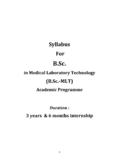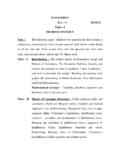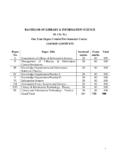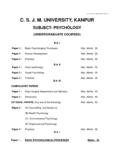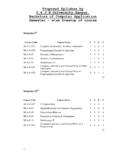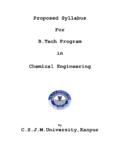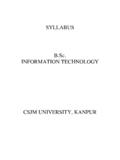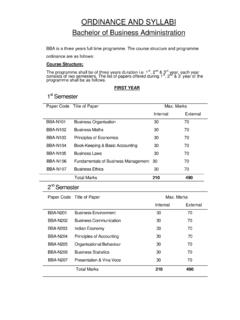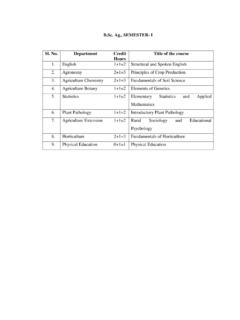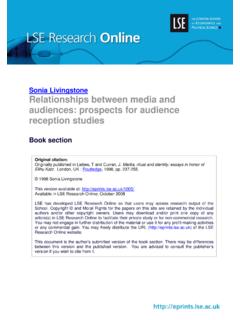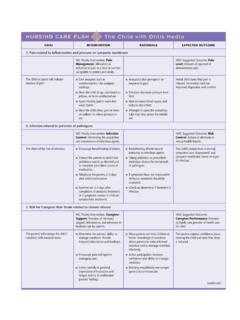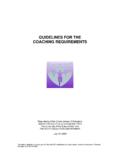Transcription of An Outline of the B.A. (Political Science) Syllabus …
1 An Outline of the ( political Science) Syllabus Structure There shall be two papers in I and II, and three papers in III. All papers are compulsory. Each paper carries 50 marks. Year Paper Title of the Paper Exam Number marks BA Part One First Basic Principles of political Science 50. Second Indian Constitution 50. BA Part Two First Indian political Thought 50. Second Comparative Government and Politics (with special 50. reference to USA, UK, China and Nigeria). BA Part Three First Western political Thinkers 50. Second Public Administration 50. Third International Politics 50. The following subject experts were involved in the making of the Syllabus - 1. Prof. Ujjwal Kumar Singh, Delhi University, Delhi 2. Prof. Ashok Upadhya, BHU, Varanasi 3. Prof. Ashutosh Kumar, Punjab University, Chandigarh 4.
2 Prof. Mirza Asmer Beg, AMU, Aligarh 5. Dr. RCS Chandel, VSSD College, Kanpur 6. Dr. Mrs. Pushpa Mishra, DAV College, Kanpur 7. Dr. Verma, Christ Church College, Kanpur Dr. Chandel Convenor Board of Studies in political Science VSSD College, Kanpur Part One Paper I - Basic Principles of political Science Course rationale : This is an introductory paper trying to expose students to some basic ideas and concepts in political Science. Effort has been made to orient students to the methodological and ideological traditions in political science. The importance of feminist perspective has been recognised. Course Content: 1. Concepts: Politics and political Science, political Thought, political Theory, political Philosophy, political Ideology. 2. Behaviouralism and Post-behaviouralism.
3 3. State: Definitions, Elements, and Theories of the Origin of State 4. Liberalism, Idealism, Anarchism, Marxism. 5. Sovereignty: Austin's Theory, Pluralist Theory. 6. Power, Authority and Legitimacy. 7. Liberty, Equality, Justice. 8. Rights, Duties and Citizenship. 9. Democracy: Representation and Participation, Civil Society. 10. Feminism. Reading List Andrew Heywood, Politics, Palgrave Foundation, New York, 2005. Joad, political Theory F. Thakurdas, Essays on political Theory, New Delhi, Gitanjali, 1982. G. Catlin, A Study of the Principles of Politics, London and New York, Oxford University Press, 1930. H. J. Laski, A Grammar of Politics, London, Allen and Unwin, 1948. Johari, Principle of Modern political Science, Sterling, Delhi, 2009. Margaret Walters, Feminism: A Very Short Introduction, Oxford, 2008.
4 Guba, An Introduction to political Theory .. political Theory And Thought, Mayur Paperback, Delhi, 2008.. , , 2005.. , , 2005. R. Dahl, Modern political Analysis, Englewood Cliffs NJ, Prentice Hall, 1963. Rajeev bhargava & Ashok Acharaya, political theory: An Introduction, Pearson Longman, Delhi, 2008. S. P. Varma, Modern political Theory, New Delhi, Vikas, 1983. Sir E. Barker, Principles of Social and political Theory, Calcutta, Oxford University Press,1976. S. Ramaswamy, political Theory: Ideas and Concepts, Delhi, Macmillan, 2002. - Part One Paper II Indian Constitution Course rationale : This paper introduces students to the Constitution of India in its structural and functional aspect. It is expected that the knowledge acquired in the introductory political theory paper shall be juxtaposed in understanding the nitty-gritty of this paper.
5 Course Content: 1. Making of Indian Constitution, Constituent Assembly: Composition and Working. 2. Preamble and Salient Features of Indian Constitution. 3. Fundamental Rights and Fundamental Duties, Directive Principles of State Policy. 4. President and Prime Minister. 5. Parliament 6. Supreme Court, Judicial Review and Judicial Activism. 7. Governor, Chief Minister and State Legislatures. 8. Panchayati Raj and Municipal Governments 9. Nature of Federal System and Centre-State Relations. 10. Election Commission and Electoral Reforms, National Commission for Scheduled Castes, National Commission for Scheduled Tribes. Reading List 1. A. G. Noorani, Constitutional Questions in India: The President, Parliament and the States, Delhi, Oxford University Press, 2000.
6 2. Narang, Indian Government and Politics, Geetanjali Publishing House, New Delhi, 1996 (Latest edition). 3. Bidyut Chakrabarty & Rajendra Kumar Pandey, Indian Government and Politics, SAGE, New Delhi, 2008. 4. Basu, An Introduction to the Constitution of India, Prentice Hall, New Delhi. (Latest Edition). 5. G. Austin, The Indian Constitution: Corner Stone of a Nation, Oxford, Oxford University Press, 1966. 6. Singh & Rekha Saxena, Indian Politics: Contemporary issues and Concerns, Prentice Hall of India, Delhi, 2008. 7. M. V. Pylee, An Introduction to the Constitution of India, New Delhi, Vikas, 1998. 8. Nirja Gopal Jayal & Pratap Bhanu Mehta, The Oxford Companion to Politics in India, Oxford University Press, New Delhi, 2010. 9. Sunder Raman. Indian Government and Politics, Allied Publishers, New Delhi, 1988.
7 10. Subhasn Kashyap, Our Constitution: An Introduction to India's Constitution and Constitutional law, national Book trust, India, New Delhi. 11. , , , . 12. , , & ( ) ,1984. - Part Two Paper I Indian political Thought Course rationale : This paper attempts to introduce students to the entire gamut of political thinking in India from the beginning to the present. It focuses on key thinkers from ancient to modern times to understand their seminal contribution to the evolution of political theorizing in India. It emphasizes on the distinctive contribution of Indian thinkers to political theorizing and the relative autonomy of Indian political thought. Course Content: 1. Indian political Thought: A Background 2. Manu 3. Kautilya 4. Raja Ram Mohan Roy 5. Swami Vivekanand 6.
8 Aurobindo Ghosh 7. 8. Gandhi 9. Nehru 10. BR Ambedkar 11. Dr. Ram Manohar Lohia Reading List 1. Appadorai, Indian political Thinking through the Ages, Khanna Publishers, Delhi, 1992. 2. A. Appadorai, Documents on political Thought in Modern India, 2 vols. Bombay Oxford University Press, 1970. 3. J. Bandopandhyay, Social and political Thought of Gandhi, Allied Publishers, Bombay, 1969. 4. Jha, political Thought in Modern India, Meenakshi Prakashan, Meerut. 5. Ramratan Ruchi Tyagi, Indian political Thought, Mayur paperbacks, 2008. 6. Mehta, Indian political Thought, Manohar, New Delhi, 1996. 7. V. R. Mehta, Foundations of Indian political Thought, New Delhi, Manohar, 1992. 8. Verma, Modern Indian political Thought, Lakshmi Naryan Aggarwal, Agra, 1974. 9.
9 Valerian Rodreigues (eds.), The Essential Writings of Ambedkar, oxford University Press, Delhi, 2004. 10. + , . 11. , . 12. , , , . - Part Two Paper II Comparative Government and Politics (With Special Reference to UK, USA, Peoples' Republic of China and Nigeria). Course rationale : This paper exposes students to the leading model constitutions of the world. The effort is also to cover leading constitutions of major continents viz. North America, Europe, Asia and Africa. These constitutions are to be studied in light of the political processes to gain understanding of the dynamics of actual politics and policy making in these countries. Course Content: 1. Governments: Parliamentary and Presidential, Unitary and Federal. 2. UK: Socio-Economic Foundations, Conventions and Traditions, The Crown, Cabinet System, Parliament, Party System, Judiciary.
10 3. USA: Socio-Economic Foundations, President, Congress, Supreme Court and Judicial Review, Party System. 4. Peoples' Republic of China: Socio-Economic Foundations, National Peoples'. Congress and its Standing Committee, President, State Council, Peoples' Courts and Peoples' Procurators, Minority Rights, Role of the Party. 5. Nigeria: Socio-Economic Foundations, President, National Assembly, Supreme Court, Minority Rights, Party System. Reading List 1. Kapoor & Mishra, Select Constitutions, S. Chand & Co., Delhi 2. Almond, G. B. Powell, K. Strom and R. Dalton, Comparative Politics Today: A. World View, Pearson Education, Delhi, 2007, 3. H. Finer, Theory and Practice of Modern Government, London, Methuen, 1969. 4. S. E. Finer, Comparative Government, Harmondsworth, Penguin, 1974.

